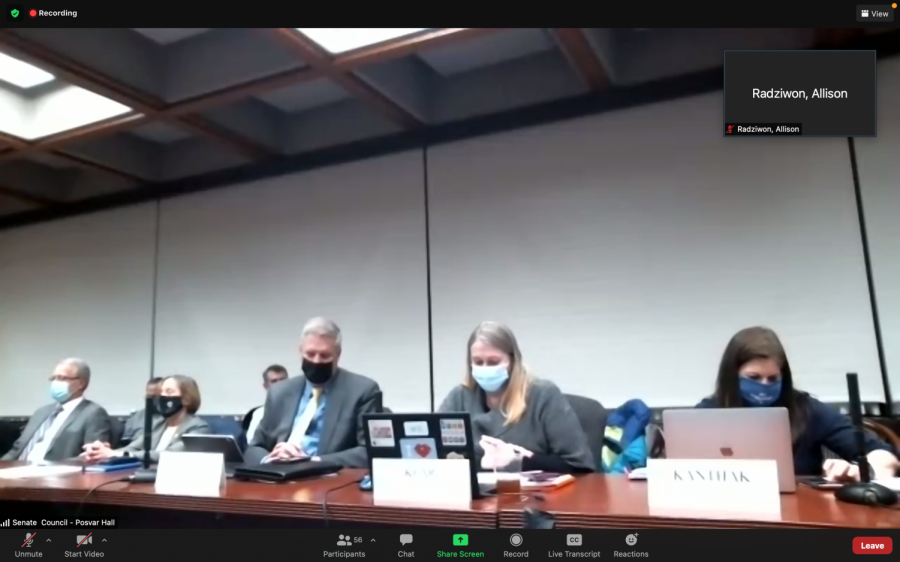Senate Council discusses vaccine mandate, approves two policies
From left, Chancellor Patrick Gallagher, Robin Kear, Senate Council president and Kris Kanthak, Senate Council vice president at a meeting in Posvar Hall on Thursday.
December 10, 2021
While the vaccine requirement for all Pitt students, faculty and staff went into effect on Monday, Chancellor Patrick Gallagher said enforcement will not officially begin until the spring semester.
“Our focus right now is to track down the relatively small numbers of folks who are still not compliant,” Gallagher said. “It’s a scattering across all campuses and various programs, and now we’re at the point that the numbers are low enough — it’s almost case management.”
Pitt’s Senate Council held its last monthly meeting of the semester on Thursday afternoon both in person at Posvar Hall and on Zoom. Besides the vaccine mandate, the council discussed and voted on two draft policies during the meeting.
According to Gallagher, administrators are reaching out to students who are not in compliance with the vaccine mandate.
“We’re reaching out to those folks. Some of those students may be graduating, or someone’s gotten the first shot, they’re in progress,” Gallagher said. “Hopefully by the time we get to either the progressive disciplinary phases or some of the student disenrollment steps that the policy calls for, we will be dealing with a very small number.”
The council discussed and voted on a draft policy regarding protection of children from abuse, which calls for employees, volunteers and students whose activities include “routinely working with minors” to have three background checks.
Linda Tashbook, co-chair of the benefits and wellness committee, said these background checks cost $50 per person and are valid for five years. Tashbook said the clearances include an FBI criminal background check, a child abuse history clearance and the Pennsylvania State Police clearance background check.
According to Tashbook, the policy explains the procedure of reporting suspected child abuse by an “existing employee, student or volunteer.” She also said employment or volunteer work will be denied if the background checks reveal a history of crimes.
“Employment appointment or volunteer service will be denied by the University, just to be clear, if the background checks revealed that within the past five years, the applicant has a record
of child abuse or a drug crime or any of the 21 crimes that are specified in the policy,” Tashbook said.
Harshitha Ramanan, the Student Government Board president, expressed concern about the financial burden of the required $50 payment on students.
“Is there a way to create an appeals process for any students that might need funds?” Ramanan said. “Because it’s a little restrictive on the student if they obtain an opportunity that they’re unable to pursue because they don’t have enough funds.”
Other members of the council — including College of General Studies Student Government President Ryan Yeager, and Abbe de Vallejo, associate professor of pediatrics and immunology — agreed with Ramanan’s suggestion of creating an appeals process.
Robin Kear, Senate Council president, said she will reach out to SGB to work with them on helping students who need financial aid in order to get these clearances.
“Actually, I was going to reach out to you to talk about that with SGB,” Kear said. “That’s what came out of last week’s assembly, to talk about whether there was any way for us to work with SGB to think about if students have a financial need. That might be able to come out of something from SGB, but we can talk further about it.”
The council voted 91% to 9% in favor of the child abuse protection policy.
Tashbook also presented another draft policy, this one revolving around HIPAA — the federal law that guides the protection of health information and confidentiality — which she said will combine the 13 separate existing policies into one policy.
Tashbook said these “covered components” — units covered by HIPAA’s protection policies — include Student Health, the School of Dental Medicine, IT and units conducting research on human subjects. Each covered component must create its own policies, according to Tashbook.
“Each covered component is responsible for making its own policies. They have autonomy within these covered components about limiting authorized access to that protected health information,” Tashbook said. “In addition, all employees of the covered components must receive annual HIPAA training.”
The council voted 93% to 7% in favor of the HIPAA policy.
During his report, Gallagher wished students luck on finals and happy holidays.
“I just wanted to wish everybody the best of luck as we complete the semester and remind everyone to take care of each other and take care of yourselves,” Gallagher said. “Hopefully you all are not looking past the finals, but are beginning to look forward to the holiday break.”








